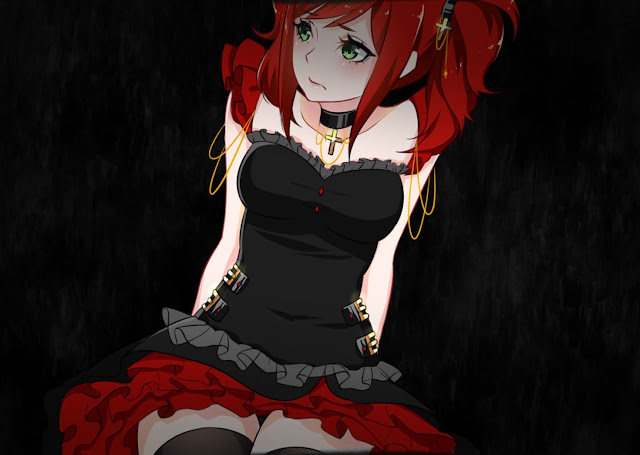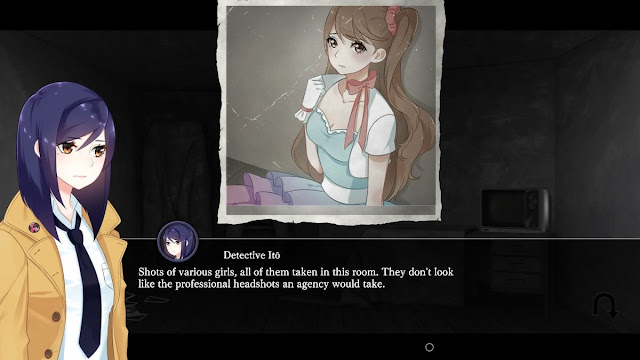Review by Matt S.
Cherrymochi is a Japanese development company with a unique distinction – most of the team are westerners, drawn from the UK, Europe and America, but all of them have extensive experience living and working in Japan. It’s rare that a game can be truly Japanese – in that it can authentically depict and reflect on the culture – while also having that perspective of outsiders looking in. Having myself spent enough time in Japan that I’m no longer a “tourist,” Tokyo Dark’s perspective and storytelling immediately resonated with me, and that initial impression played out across the entire game. This is a truly memorable and fascinating bit of art.
Tokyo Dark is a horror game that takes the popular and well-known parts of Tokyo and its surrounding environments – Shinjuku, Akihabara, Asakusa, Kamakura, Aokigahara – and peels back the glamour to depict and deconstruct the seedier side of these locations. The best horror is always rooted in something real, and with Tokyo Dark the real is found in the way that the various entertainment industries and playgrounds of Japan have a tendency to use and exploit women. From cults to idol culture (itself very much a kind of cult), to hostess clubs, the illegal underground, and the professional world, there is a decided dark underbelly to the cute skirts, maid cafes, preppy music and awesome nightlife that we all know and love of the country. Furthermore, by layering some very Shinto spirituality and ghostly happenings over the top of the very modern Japan, Tokyo Dark finds itself offering players a truly twisted, relentlessly dark twist on the eclectic blend of modernity and tradition that has always characterised the nation.. It’s more like a supernatural Se7en than it is Friday the 13th, and that’s just fine by me, because the intensity of this one’s story carries every bit the punch that Fincher’s cinematic masterpiece does.
It’s not all seedy nastiness, though. Tokyo Dark is also a story of women’s empowerment within these systems. You play as Detective Ito, an incredibly strong character, and one of the rare women to reach a position of importance among Tokyo detectives. For me one of the most memorable scenes is when she twists a bully (male) detective into doing her a favour by “acting as a woman should” and behaving meek and subservient. It’s a subversive scene, because she is anything but that, but it’s scenes like that that demonstrate just how much of an uphill battle Ito faces… before even trying to figure out the disappearance of her partner. She’s not the only strong woman defying the odds in Tokyo Dark. There’s also the head of the Yakuza gang that at one point you need to interact with. She, too, is a woman, and manages that role by ensuring that her underlings never see a feminine side to her.
It’s always a risk to write the word “feminist” within the context of a video game review, because with too many people in the community that’s like waving a red flag, with red neon lights across it, in the face of an irrationally angry bull. It’s a quick way to get too many people to dismiss a game and its narrative, but nonetheless Tokyo Dark is powerfully feminist, and one of the better examples of it in video games. Tokyo Dark isn’t “preachy” in its feminism, but it nonetheless brings together a range of women who are strong and empowered on one level or another, and depicts their struggles within the male dominated social environment that they operate in. What’s so impressive about Tokyo Dark is just how well-written this all is and how interesting and enjoyable every character is. Every character is richly depicted with a brilliant balance between humour and the game’s more intense themes. Seeing the aforementioned Yakuza leader go gaga over a fluffy cat is hilarious and yet writen in such a way that it somehow avoids breaking her character. Ito’s blissful response to eating takoyaki (deep-fried octopus balls) is another particularly memorable moment of levity, and adds nuance to her otherwise no-nonsense exterior. It’s not easy to give serious characters in serious roles moments of levity that don’t break immersion, but the writing team here have handled it with panache.
A run through Tokyo Dark lasts around five hours, but there are eleven different endings, and no one ending really answers all the questions that you’re going to have.The decisions that lead to those different endings are quite explicitly clear, though, so on replays it’s easy to streamline the process of tracking down those additional endings. Due to the intensity of its themes, Tokyo Dark couldn’t have been much longer than it is because it would have become overwhelming… and I do always appreciate when a developer respects its narrative enough not to push things in the interest of “content”.
One element I did not enjoy, however, was the SPIN system. Tokyo Dark keeps track of four different statistics (Sanity, Professionalism, Investigation, and Neurosis), and actions and decisions that you make in the game will affect those statistics. If Ito sees a dead body her sanity will take a hit (which is an odd thing for a detective to start to lose it over, but gets a pass in the context of the overload of horrific imagery that Ito is witnessing). If Ito threatens a co-worker with violence her professionalism statistic will dive, but if she wins them over with a bottle of good sake and it will get a boost instead. Drinking on the job with a bartender might help Ito get that information that she needs (investigation score boost), but with the consequence that she is then seen as unprofessional by anyone who talks to her afterwards.
I get what the development team was trying to do here, and in fairness those decisions that you make do come back to haunt Ito in key moments. However, it would have been much better for the game to be tracking these things in the background, because I did find myself constantly pulling up my character chart, and making decisions based on how it would affect the balance of my “scores”. Every time I did that I was pulled just that little bit out of the experience, as I was being reminded that I was playing a game, rather than following a compelling, twisting narrative.
Though Tokyo Dark has some rather simple visuals on a technical level – the character profiles look like low-budget visual novel characters, and the animation as Ito moves around is stiff, the art direction in this game is impeccable. With each area the team have effectively captured what that area is known for best – Kamakura being a breezy, old-style retreat from the city, Kabukicho being a neon-infused den of vice – and then twisted it, to fit with the sinister undertones of the overall narrative. Perhaps you do have to know Kamakura to understand how truly unsettling the visual is of cherry blossoms springing out in autumn, but such a simple visual direction truly reinforced the creepiness of the scene on me. Supporting this is a soundtrack that is truly memorable. That’s not to say it’s always pleasant, though, as there’s a fair amount of discordant, clashing music, and little cohesion from one piece of music to the next. Emerging from a cat cafe with a laid-back music track full of “meow” motifs to to move to the harsh chant-like rhythm that plays when you’re in Asakusa, is uncomfortably jarring. That too fits with Tokyo Dark’s theme as well. It’s constantly unsettling and off-putting, and that’s the entire point.
Like the very best horror, Tokyo Dark takes a look at real-world issues and tensions in a way that’s memorably shocking. There’s a strong subtext to Tokyo Dark’s story, and its told in a nuanced way, with memorable characters and intense imagery. Cherrymochi is a unique developer that has created a unique thing here, and for that the team has certainly earned my attention for whatever it has coming next.
– Matt S.
Editor-in-Chief
Find me on Twitter: @digitallydownld









